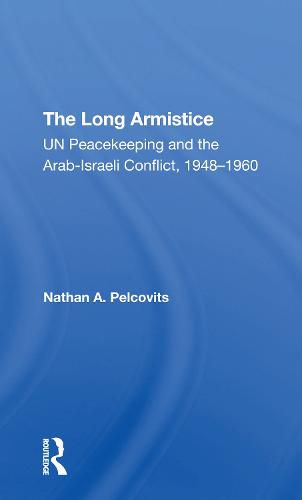Readings Newsletter
Become a Readings Member to make your shopping experience even easier.
Sign in or sign up for free!
You’re not far away from qualifying for FREE standard shipping within Australia
You’ve qualified for FREE standard shipping within Australia
The cart is loading…






Drawing on previously untapped documents, interviews with key actors, and his own experiences in the Department of State, Nathan Pelcovits takes a fresh look at the impact of UN intervention, as peacekeeper and peacemaker, on the Arab-Israeli conflict during the formative years between 1948 and 1960. He examines the reasons behind the UN assumption of a quasi-custodial role in the dispute and how it is that Israel and the Arab states have come to hold diametrically opposed views of the value of engaging the UN as intermediary, with the UN-Israel relationship cooling into one of mutual suspicion and mistrust. Most relevant to the current peace process, Pelcovits explains why UN action shifted early in the game from an ambitious effort at peaceful settlement to keeping the peace of a long armistice. Pelcovits argues that the wounds of the formative years have affected the dynamic of the peace process to this day. The UN has been accorded a marginal role in the negotiations-ceremonial and passive-and UN peacekeepers are not likely to be enlisted as guarantors of the settlement.
$9.00 standard shipping within Australia
FREE standard shipping within Australia for orders over $100.00
Express & International shipping calculated at checkout
Drawing on previously untapped documents, interviews with key actors, and his own experiences in the Department of State, Nathan Pelcovits takes a fresh look at the impact of UN intervention, as peacekeeper and peacemaker, on the Arab-Israeli conflict during the formative years between 1948 and 1960. He examines the reasons behind the UN assumption of a quasi-custodial role in the dispute and how it is that Israel and the Arab states have come to hold diametrically opposed views of the value of engaging the UN as intermediary, with the UN-Israel relationship cooling into one of mutual suspicion and mistrust. Most relevant to the current peace process, Pelcovits explains why UN action shifted early in the game from an ambitious effort at peaceful settlement to keeping the peace of a long armistice. Pelcovits argues that the wounds of the formative years have affected the dynamic of the peace process to this day. The UN has been accorded a marginal role in the negotiations-ceremonial and passive-and UN peacekeepers are not likely to be enlisted as guarantors of the settlement.